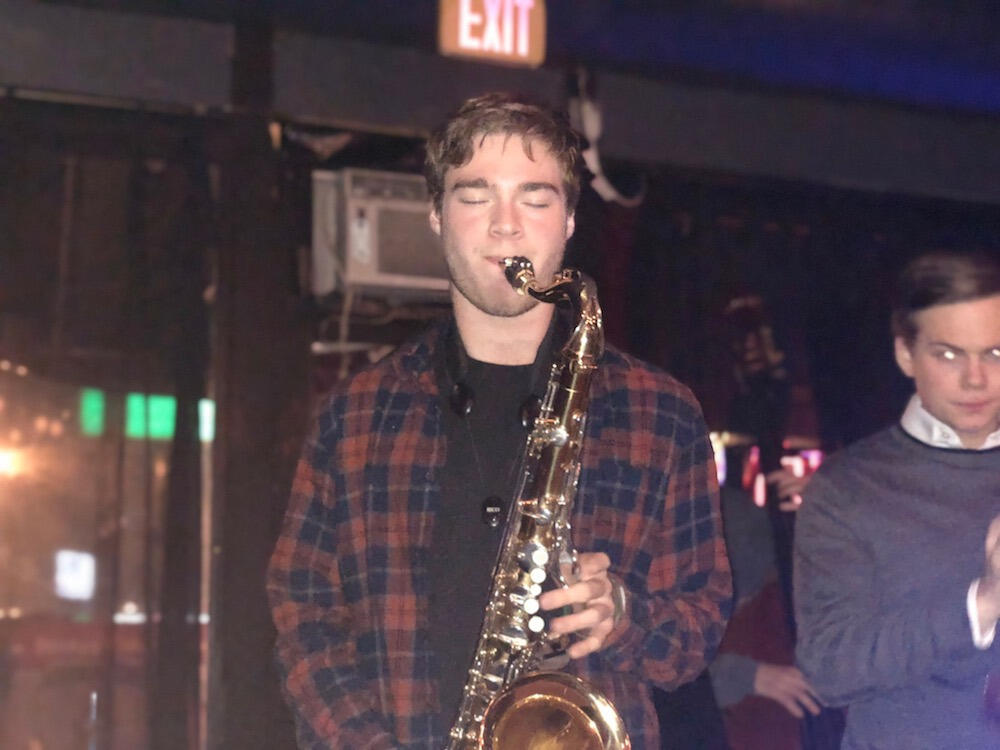
May 7, 2019
A new computer science class is helping students across VCU stay up to code
Share this story
On Friday nights, Thomas Levine loves to play saxophone at Emilio’s, the Broad Street club that’s a second home to VCU Jazz Studies students. The rest of the week, you might also find Levine, a sophomore in the School of the Arts, at the keyboard — a computer keyboard, that is — typing, testing and troubleshooting code for a new program or application.
Levine is a student in Introduction to Computing, the first course in a new Fundamentals of Computing specialization the VCU College of Engineering developed to give students in any field computer skills that will help make them instantly employable upon graduation. Students learn the Python programming language and how to start thinking like a programmer. Those who complete a four-course package will earn a computer science specialization from VCU. Students who complete three of the four will earn a digital generalist credential from the Greater Washington Partnership, which gives them exclusive hiring advantages with participating companies.

Levine’s journey into the first steps of VCU’s new tech specialization began, appropriately enough, with technology. “I saw an ad for the course on Instagram last fall — and I’m a millennial, so of course I’m on Instagram a lot,” Levine said with a laugh. He said he signed up because he is always interested in adding new job skills to his resume. He thinks the class has paid off “a hundred percent” already.
“Just having a ton of extracurriculars doesn’t really show much about the skills a person has,” Levine said. “But skills I learn in a class show what I can do much more effectively. And I’m definitely putting on my resume that I took a programming class and know Python!”
That’s music to the ears of Caroline Budwell, Ph.D., an assistant professor of computer science. She helped develop the course and specialization as part of VCU Engineering’s push to strengthen the tech-talent pipeline and give students marketable skills.
“This course and the specialization are a heads up to students in many ways. For one thing, many employers have a standard logic test for job applicants in more technical positions. Students are likely to do better on those tests after this course,” she said. “Putting coding and programming skills on your resume also demonstrates trainability. Employers think, ‘Well, here’s this great English major who can really write, and we think she might have some technical aptitude since she was successful in a technical course where they learned Python, so we can train her on our technical tools.’”
Going in, Levine knew the class would give him practical, career-focused skills. What surprised him were the creative inspiration and life skills he also gained.

“When I’m programming, it’s amazing to see how one piece of computer code can do a thousand different things,” he said. “It’s actually made me think about music differently. I’m now thinking about little pieces — musical cadences or key changes I can use in different ways. It has made me start thinking about resources in a more creative, ambitious way.”
It has also made him more conscious of details and decisions in everyday life. Learning how computers analyze and solve problems has fine-tuned Levine’s thinking.
“Understanding that computers solve problems in one of three ways has changed how I think about problems. I’m thinking more systematically about decisions I am making. ‘How am I using my time,’ for example? ‘What should I be doing? Why am I not?’ I’m not advanced in programming yet, but I can see using these concepts forever,” he said. “Whether it’s music or advertising, which I may double major in, the common denominator is creative problem solving, which is also what this class is about.”
Registration for the summer section of Introduction to Computing (CMSC 191), which runs May 20 to July 10, is open. All four courses for the Fundamentals of Computing specialization are offered for the fall 2019 semester.
Subscribe to VCU News
Subscribe to VCU News at newsletter.vcu.edu and receive a selection of stories, videos, photos, news clips and event listings in your inbox.







